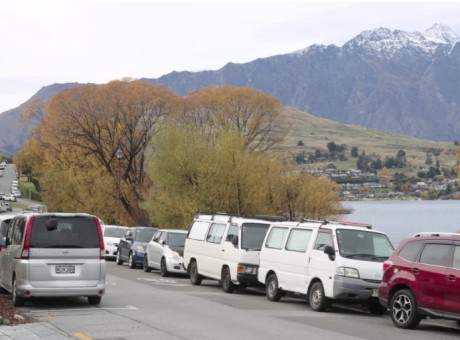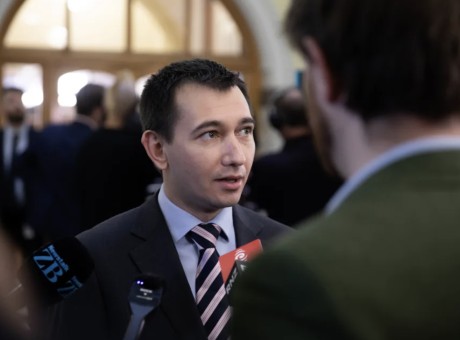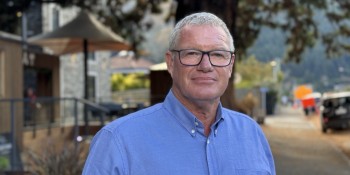ACT's top candidates: The faces and aspirations aiming for government
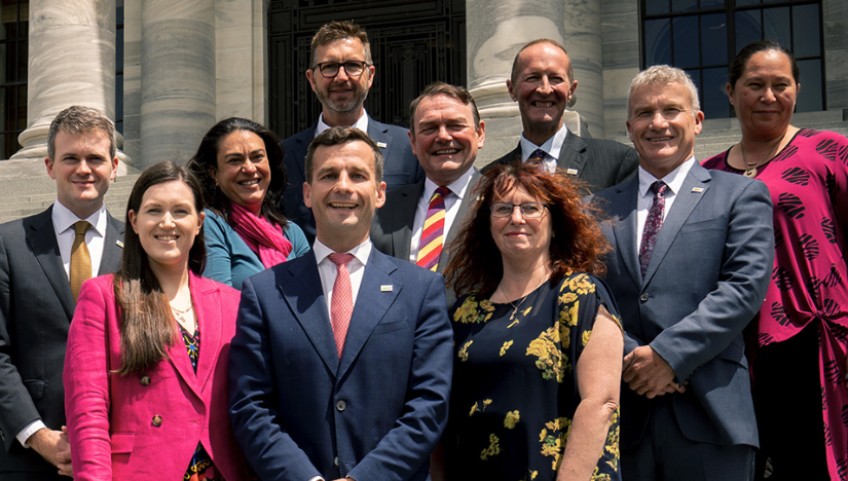
The 2020 election dubbed the "red wave" saw Labour able to govern alone, but it also saw ACT grow its caucus from just Seymour to 10 MPs, commemorated by this photo in Brooke van Velden's office. Recent polls suggest they could pick up another six or seven MPs, likely in government with National. Photo: RNZ / Angus Dreaver
The ACT Party has tracked an extraordinary path to power since the 2017 Election, growing from one-man-band David Seymour to a team of 10 MPs.
On current polling, National and ACT have the numbers to form the next government and ACT's caucus will grow again, possibly picking up ministerial positions.
Party leader David Seymour is no stranger to the public eye but his top MPs aren't so well known. Who are they? And what would they like to do if afforded the power the polls predict?
Brooke van Velden
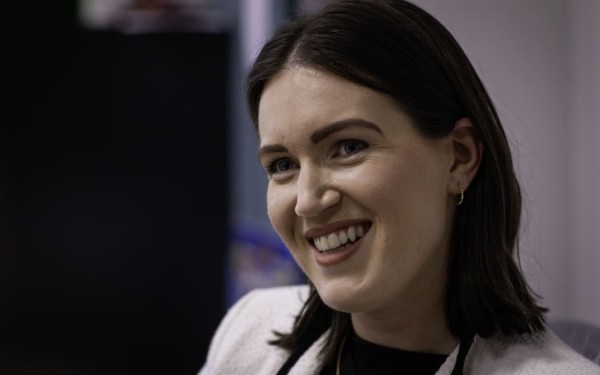
Photo: RNZ / Angus Dreaver
First arriving to Parliament as a 27-year-old lobbyist, working behind the scenes to rally support across the house for David Seymour's End of Life Choice Act, Brooke van Velden has risen quickly to become his second in command. She holds spokesperson roles for bulky portfolios like foreign affairs, health and trade. As if that - and taking up tennis lessons - isn't enough to keep her busy, van Velden has made a gutsy bid for the Tāmaki electorate; a seat held by National for all but two terms in its history.
She makes no apology for directly competing against the very party ACT plans to support in a potential right-bloc government, including not giving them a heads up she planned to do it: "The seat doesn't belong to the National Party; it belongs to the people of Tāmaki," she says. "Over the past two and a half years, an outstanding number have approached me and said they wanted me to run to win the seat because they don't feel well represented and well served by the current MP."
Like many of ACT's MPs, van Velden has been travelling around the country to engage with people and says those she's spoken to have real concerns about divisiveness in policy areas like health. "Everybody is being divided and a lot of it is based on race. It's unnecessary tension and resentment that's been built up by this government." ACT itself has copped criticism for fuelling divisiveness, having described the 'ethnicity' factor in the health equity adjustor tool as discriminatory. Research, like this study published in the New Zealand Medical Journal, establishes the problem at hand.
ACT does support prioritising people on the basis of their location or clinical priority - just not their ethnicity. Asked how the party plans to mitigate unconscious bias in the healthcare system, van Velden says it's not necessary: "I've spoken to doctors that say they aren't racist, you know? So I don't see how you can pose that question ... how would you possibly get rid of that if you can't actually tell what it is?"
More broadly on health, ACT is pitching more funding for GPs, a fast-tracked process to get qualified migrants into the health workforce and giving the health minister the power to override the decisions or processes of regulatory authorities. On foreign affairs, van Velden says ACT wants defence spending boosted to to 2 percent of GDP in line with Australian and NATO targets; and more trade diversification, particularly into the Indian and American markets.
Nicole McKee
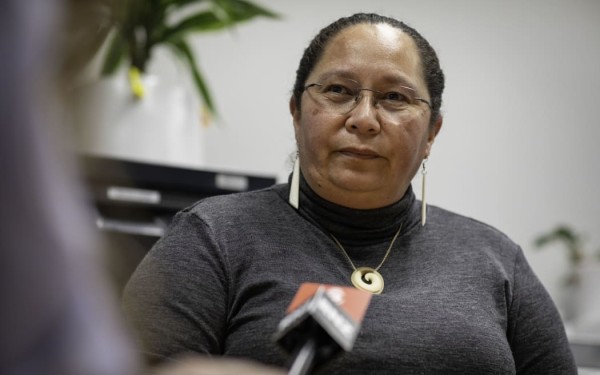
Photo: RNZ / Angus Dreaver
A netballer, target shooter, hunter, mother, knitter, firearms advocate, business owner and MP, Nicole McKee at third on the party list has many feathers in her cap. She says she never considered herself all that interesting until she was elected to Parliament in 2020, drawing attention in the halls of power for the wealth real-life experience she brought.
"I wonder whether it's just the diversity of everything that I've done but I've only been able to do that because I'm 51-years-old. I've got a few years behind me."
McKee carries an air of humble determination she's clearly applied to her Parliamentary work this term, dipping her toe into the world of academic study for the first time, completing a public policy paper at Victoria University. "I quite literally thought I was too dumb to do it," she says, "I don't have a university degree, and it was David Seymour who said 'no, I think you can do it, you can definitely do it and it will set you up to understand if we get into government what your role could be and how to effectively do it better'."
McKee became a strong voice for the firearms community after the March 15 terror attacks. She's now pushing for big changes to New Zealand's firearms laws and, despite sitting at number three on the list, doesn't necessarily see that coming with a ministerial hat. "I've made it quite clear that I want to make some firearms reform. I don't need to be in a ministerial position to do that just as long we effect real change."
ACT has seized on public concern about law and order and wants more people in prison, tougher sentencing laws and police to have more power to seize the assets of gang members found with illegal firearms. It's so far proposed fairly radical changes to firearms laws, including repealing the gun register introduced after the mosque attacks that both police and gun control advocates say reduces firearm harm. National has, to date, supported the gun register.
McKee, once contracted to the police to deliver a firearms licensing service to isolated communities, argues recent law changes have led unlicensed hunters' to unload their illegal guns into the black market.
"The moment that police come in and start to crack down on certain areas, all of these guns just disappear; some of them quite literally go into the blackberry bush out the back of a hall and some of them just feed off into the gangs in order to get rid of them."
McKee says ACT could try in a coalition arrangement to reintroduce her bill allowing police to freeze and seize gang assets if an illegal firearm was discovered. She says being tough on crime is only part of reducing crime harm.
"We also have to look at the drivers: what is making these people go into gangs in the first place? A lot of that can come back down to how many generations are sitting on a benefit. If you have, what we've seen, a third generation sitting on a benefit, what is there to aspire to?"
Todd Stephenson
Ranked fourth on ACT's list, Todd Stephenson has almost certainly secured himself a seat in Parliament after the election, jumping ahead of a handful of sitting MPs.
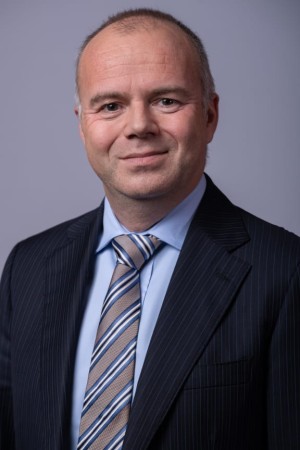
ACT's Todd Stephenson - Moving to Queenstown
He may be new to the halls of power but he's no stranger to the party, having been a member for nearly 30 years and formerly worked for ACT's former president Catherine Isaac. "Her and I are very friendly, stay in touch, and it was really her a short while ago that suggested this is something I should consider."
Stephenson is leaving a career in corporate healthcare in Australia to move to Queenstown with his partner Alex to pursue politics. "I'm going against the tide. As you probably know, New Zealand is losing about 13,500 people to Australia every year but I'm one of the people coming back and bringing one Australian with me."
Stephenson says ACT's classic liberal core and commitment to private enterprise and individual freedom is what drew him to join so many years ago, and to stand on the list this election.
He's coy about pitching any of his own policy ideas; seeing his upcoming role in ACT's caucus as bringing his corporate, strategic, policy and government-relations experience to the party: "I share ACT's concern, and frankly the concern of a lot of Kiwis, that New Zealand is not on the right track and at risk of losing its first-world-country status. And we can see this through those kind of slipping economic indicators and other areas like education standards."
Andrew Hoggard
It raised a few eyebrows when Andrew Hoggard announced he was quitting his job as president of Federated Farmers early, to contest this year's election for the ACT Party. At fifth on the list, he's almost certainly guaranteed a seat in Parliament and is looking forward to swapping the Red Band boots on his Feilding dairy farm for dress shoes in Wellington.
Unsurprisingly, he's a strong believer in "farming smart, not less" and doesn't want to see the agriculture sector bend over backwards for what is, he says, small scale emissions reductions compared to other countries.
"What frustrates me so much is the debate that we hear here in New Zealand is, 'we've got to reduce our cow numbers and sheep and beef, and that'll stop climate change'. Well, no it won't. If you look at milk alone we're just under 2 percent of world milk supply. The largest supplier, that's India ... have a footprint that's six to 10 times what New Zealand's is by kilogram of milk solid. So their plans for growth with their footprint will completely wipe out any little decreases that we make here in New Zealand."
Hoggard sees new technologies - like methane inhibitor Bovaer (or 3-NOP) - as the solution to curbing agricultural emissions without reducing farm production.
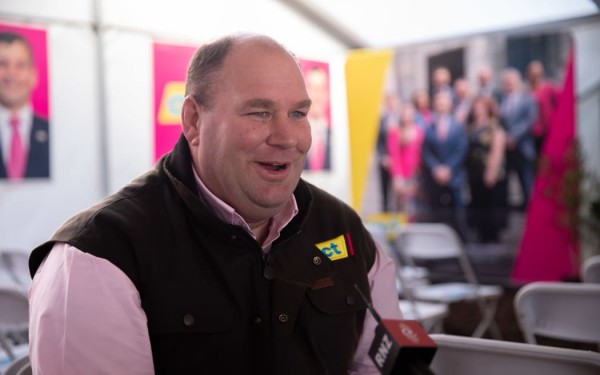
Andrew Hoggard - former president of Federated Farmers
"I think we're getting a lot of good, new, sensible technologies coming on board which will reduce [emissions] and I think it's just a case of focusing on the science solutions that's going to get us there." With the ACT Party opposed to the Zero Carbon Act and its emissions budgets, it's putting all of its climate policy eggs in the market basket. "I think it's key that government gets out of the way and lets the market do what it does," Hoggard says.
He also wants to see a nationwide "blueprint" for responding to adverse weather events, having experienced flooding on his farm before and closely watched the fallout from Cyclone Gabrielle: "It continually seems to be a response based on that individual circumstance and I do think we'd probably be better off if we had a sort of gameplan as to who's going to be responsible for what; people knowing here are the risks you'll take by yourself and here is where government support would come in place."
Hoggard also believes MPI is "distracted" trying to market New Zealand products, and says that's a job that belongs to the likes of Fonterra, Silver Fern Farms and Zespri. MPI should instead be focused on the core business of keeping trade pathways open, he says.
Karen Chhour
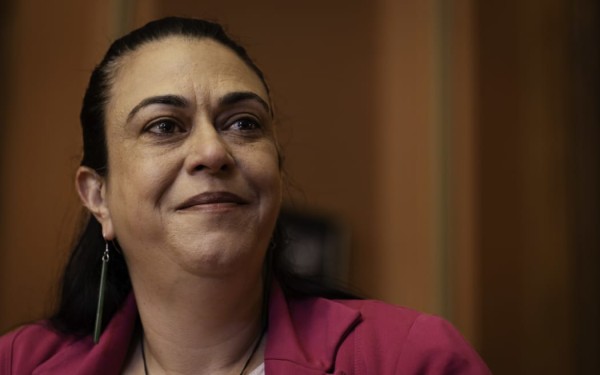
Photo: RNZ / Angus Dreaver
Having made a name for herself as a state care survivor in Parliament, speaking up for those who can't do so themselves, Karen Chhour's first term in Parliament has flown by. Drawing respect from across the house, she's spoken openly about the impact of her time in care and ongoing concerns for young people in the system. "You do feel that you have the weight on your shoulders sometimes. Have I said the right thing? Have I said enough? Could I have said more? But I just think you do the best you can do at the time and hope that's enough."
Chhour has used her lived experience to develop a plan to totally reform Oranga Tamariki, aiming to put care services back into communities - with accountability measures. The policy includes making the Independent Children's Monitor (ICM) an Independent Crown Entity and giving the ICM the power to monitor the performance of the chief executive, who would also be held ultimately responsible for the agency's actions. It also proposes redeveloping social worker jobs into two categories: mentors employed by the ICM to support children in care, and child protection officers employed by Oranga Tamariki to enforce the law. Ultimately, Chhour says there must be better hiring practices for roles trusted to care for young people and that staff need better training and skills.
"What we need to be careful of is when we go community-based is making sure that that accountability is there as well," she says. "Not just putting it in the hands of communities and saying 'have at it' because some organisations work better than others and unfortunately when it comes to our most vulnerable there will always be predators out there to take advantage of our most vulnerable."
Chhour said government's management of the state care system over this term had been "very reactive" with a misguided focus of "putting out fires left, right and centre".
"The biggest bugbear of mine is hearing the words, 'we know we have more work to do' because that seems to be the response we hear quite a lot. If you know there's more work to do, why hasn't it been done?"
As part of coverage for the 2023 election, RNZ is looking into the minor parties' prospects and the influence they could wield in coalition. Watch out for more in this week's Focus on Politics podcast, and further articles.







